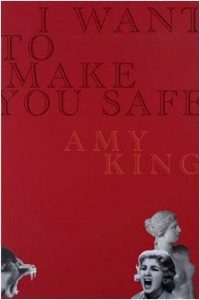 Reviewed by Carol Dorf
Reviewed by Carol Dorf
– Although it is “difficult to get the news from poems” Amy King’s poetry helps the reader notice and pay attention to what is essential. Her poetry juxtaposes disparate aspects of personal history, social context and language providing the reader with more complex understandings of our lives. The second poem in I Want to Make You Safe, “Follow the Leader of my Silken Teeth,” provides the reader with an understanding of King’s ars poetica, while referring to the art of Janet Cardiff. The poem begins, “And suddenly, art is a hand planted from the wrist/down into the earth’s epidermis….We think we know things./Animal shapes. The songs of undiscovered tribes. How to hold baby diamonds. Scratch the fur off why.” These images provide the reader with a sensory connection while frequently shifting direction to bring into question whether we actually know what we believe we know.
Many poems in I Want to Make You Safe explore the range of the body’s experience from illness, identity, love and sex to having a political body in the world. There are a number of images of giving birth an infancy as in “The Identity In My Crisis” where King says in reference to breaking away from “the language of the fathers, … This immersion has made me a model/for your captivity digest, a cavity/just as clean as we birthed from a hole, far ago, and embryo buried in the roundest tree hollow…” In these images of birth, King calls into question the story of the fathers, the captivity experience, and instead resituates birth back to the natural world.
This book’s final poem “The Opera of Peace,” brings infancy images into the idea of milk while she at the same time seeks to “embrace myself/as a childless person born.” The narrator refers to herself as “the cradle of maybe,” and talks of giving birth to a wren. Here, she uses the power of the images of mothering to honor her own choice as a childless woman.
In structure, I Want to Make You Safe, balances a number of shorter, more lyrical poems like “I Want To Steal The Darkness,” where the narrator says, “On my oyster afternoon/the sea’s a safety, how we rise/then the grass returns, dune again and the short history of summer…” with longer poems. The longer poems like the title poem and “The Opera of Peace” give King room to work on a large canvas and see how her ideas and images collage together into a lovely expansive understanding of what life is like in these times.
In her essay “Poetry and Commitment,” the poet Adrienne Rich said, “poetry has the capacity — in its own ways and by its own means — to remind us of something we are forbidden to see…The ongoing future, written off over and over, is still within view.” I think Rich would have appreciated the intention of Amy King’s poetry to open our eyes to the complexity of our lives within our bodies in this political world.
Amy King
I Want to Make You Safe
Litmus Press
Paperback, 9781933959238,87pp
November 2011
Carol Dorf’s poetry and reviews appear in Sentence, New Pages, Vinyl, Qarrtsiluni, Sin Fronteras, Spillway, Hip Mama: The Parenting Zine, The Mom Egg, Canary, In Posse Review, Moira, Feminist Studies, The Barefoot Review, OVS, Fringe, The Midway, and Poemeleon. They have been anthologized in Not a Muse, Boomer Girls, and elsewhere. She is poetry editor of Talking Writing, and lives in Northern California with her partner and their teenage daughter.
